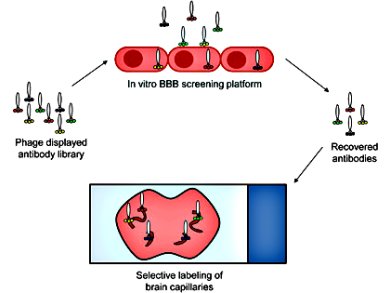The blood–brain barrier (BBB) represents an important biological barrier between the blood and the brain. It consists of endothelial cells covering the vessels in the brain and which tightly control the access of every molecule to the brain. Even though the BBB is essential for the protection of the brain, it also has negative impacts as it also prevents the access of therapeutics to the brain. One solution is to connect the drug to an antibody, which is recognized by specific receptors at the BBB and then collectively absorbed into the brain parenchyma.
Eric Shusta, University of Wisconsin-Madison, Wisconsin, USA, and colleagues screened an human antibody library with 5·108 antibodies and selected new antibody fragments that bind on towards human brain endothelial cells but not to endothelial cells found elsewhere in the body. After three rounds of screening three different antibodies were identified with good specific binding properties. Two of these showed also in vivo selectivity for the cells of the BBB.
However, further research is needed to see if the antibody fragments identified also will be transported into the brain parenchyma, making it a suitable adjunct for non-invasive drug delivery to the brain.
- Identifying blood–brain-barrier selective single-chain antibody fragments,
Angela R. Jones, C. Christopher Stutz, Yu Zhou, James D. Marks, Eric V. Shusta,
Biotechnol. J. 2014.
DOI: 10.1002/biot.201300550




